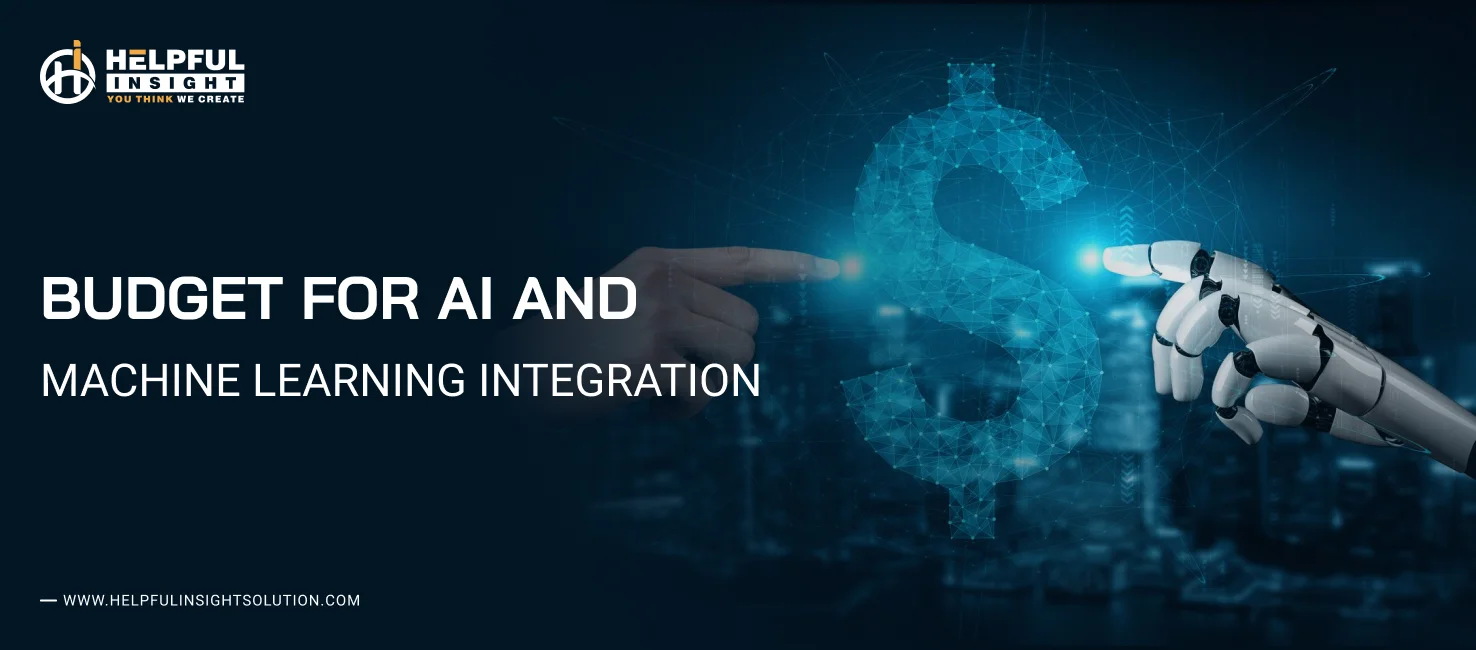In the rapidly evolving landscape of technology, integrating AI and machine learning (ML) into your app can significantly enhance its capabilities, user experience, and overall value. However, many businesses grapple with the question: How much should you budget for AI and ML integration in your app?
As Artificial Intelligence continues to shape the future of technology, investing in these innovations can position your app for long-term success. If you’re looking to hire experts in custom app development or seek guidance from a reputable mobile app development company, start by outlining your objectives and exploring the best AI solutions for your needs.
In this detailed blog post, we’ll break down the costs involved, and the factors influencing your budget, and provide tips for a successful AI integration in mobile app development.
Understanding AI and Machine Learning
Before diving into budgeting, it’s crucial to understand what AI and machine learning entail. AI app development refers to computer systems that simulate human intelligence, while machine learning is a subset of AI that enables systems to learn from data and improve over time without being explicitly programmed.
Why Integrate AI and ML in Your App?
- Enhanced User Experience (UX): Personalization in apps, chatbots, and intelligent recommendations can greatly improve user engagement.
- Automation of Tasks: AI can automate repetitive tasks, saving time and resources.
- Data Insights: Machine learning algorithms can analyze vast amounts of data, providing actionable insights for businesses.
AI Pricing: How Much Does Artificial Intelligence Cost?
The complexity of your AI application significantly impacts app development costs. Simple applications, such as chatbots or basic recommendation systems, generally cost less to develop. In contrast, advanced AI solutions, such as machine learning algorithms, natural language processing (NLP), or computer vision applications, require more intricate coding and data processing, leading to higher expenses.
1. Key Considerations:
- Functionality: More features typically mean higher costs.
- Algorithm Type: Different AI algorithms (supervised, unsupervised, reinforcement learning) come with varying development requirements.
2. Data Requirements
Data is the backbone of AI applications. The volume, quality, and type of data you need can dramatically affect application development costs.
Factors to Consider:
- Data Collection: Gathering high-quality data can be time-consuming and expensive, particularly if you need to source it from third-party providers.
- Data Processing and Cleaning: Before use, data often requires preprocessing to ensure accuracy, which adds to costs.
3. Development Team Expertise
The skill level and expertise of your development team are critical in determining the overall project cost. Hiring seasoned expert app developers with experience in AI technologies can lead to higher upfront costs, but their expertise may reduce the time to market and improve the application’s quality.
Types of Professionals Needed:
- Data Scientists: For building and refining models.
- AI Engineers: To integrate AI into the application.
- UI/UX Designers: To create an intuitive user interface.
4. Technology Stack
Choosing the right technology stack also affects mobile app development costs. The tools and platforms selected can vary in price based on their licensing fees, performance capabilities, and integration complexity.
Common Technologies Used:
- Frameworks and Libraries: TensorFlow, PyTorch, or Keras for AI applications.
- Cloud Services: AWS, Google Cloud, or Azure can incur additional costs based on usage.
5. Platform and Deployment
The platform on which the AI app will run like android app development or IOS app development also influences costs. Developing for multiple platforms often means increased complexity and higher expenses due to the need for cross-platform compatibility or multiple codebases.
Deployment Considerations:
- Cloud vs. On-Premise: Cloud deployment can be more cost-effective, but ongoing fees may accumulate.
- Maintenance and Updates: Continuous updates and maintenance are necessary for optimal performance and can keep separate budgets on post launch app development cost.
6. Regulatory Compliance and Security
AI applications, especially those handling sensitive data, must comply with various regulations (e.g., GDPR, HIPAA). Ensuring compliance requires additional development time and resources, thereby increasing costs.
Security Features:
- Data Encryption: Protecting user data adds complexity.
- Access Controls: Implementing robust user authentication can also drive up expenses.
7. Testing and Quality Assurance
Rigorous testing is vital to ensure that the AI app functions as intended. The cost of testing can vary based on the complexity of the app and the number of iterations needed to refine it.
Testing Strategies:
- Manual vs. Automated Testing: Automated testing can reduce long-term costs but may require upfront investment.
- User Acceptance Testing (UAT): Engaging end-users to validate functionality can add to costs but is essential for success.
8. Project Duration
The timeline for your project can significantly impact overall costs. Longer development times often lead to increased labor costs, as well as potential fluctuations in team availability and project management expenses.
Here’s a cost breakdown table for AI app development in U.S.. Please note that these figures can vary widely based on specific project requirements and market conditions.
| Cost Factor | Estimated Cost Range |
|---|---|
| 1. Complexity of the Solution | |
| – Simple App (e.g., chatbot) | $10,000 – $30,000 |
| – Intermediate App (e.g., basic ML) | $30,000 – $100,000 |
| – Complex App (e.g., advanced ML/NLP) | $100,000 – $500,000 |
| 2. Data Requirements | |
| – Data Collection | $5,000 – $50,000 |
| – Data Processing and Cleaning | $3,000 – $20,000 |
| 3. Development Team Expertise | |
| – Data Scientist | $50 – $200/hour |
| – AI Engineer | $40 – $150/hour |
| – UI/UX Designer | $30 – $150/hour |
| 4. Technology Stack | |
| – Licensing Fees | $1,000 – $20,000 |
| – Cloud Services (monthly) | $50 – $500+ (based on usage) |
| 5. Platform and Deployment | |
| – Single Platform Development | $15,000 – $50,000 |
| – Cross-Platform Development | $30,000 – $100,000 |
| 6. Regulatory Compliance and Security | |
| – Compliance Costs | $5,000 – $30,000 |
| – Security Features Implementation | $10,000 – $50,000 |
| 7. Testing and Quality Assurance | |
| – Manual Testing | $5,000 – $20,000 |
| – Automated Testing Setup | $3,000 – $15,000 |
| 8. Project Duration | |
| – Long-term Maintenance (annual) | $10,000 – $50,000 |
Total Estimated Cost Range:
- Low Complexity:$30,000 – $60,000
- Medium Complexity:$70,000 – $200,000
- High Complexity:$200,000 – $1,000,000+
Is AI Worth the Price Tag in Mobile App Development? When Should You Use It?
As the landscape of mobile app development evolves, businesses and developers often ponder: Is AI worth the price tag? With its potential to revolutionize user experiences and optimize functionality, understanding when and how to integrate AI is crucial. In this blog, we’ll explore the value of AI in mobile app development, provide cost estimations, and discuss the ideal scenarios for its implementation.
The Value of AI in Mobile App Development
Key Benefits of AI Integration
- Enhanced User Experience (UX):
- Personalization: AI can tailor content and recommendations based on user behavior, making apps more engaging and relevant.
- Natural Language Processing (NLP):Incorporating chatbots and voice assistants can significantly improve user interaction and satisfaction.
- Automation of Processes:
- Task Automation: AI can automate repetitive tasks, such as data entry or customer support, allowing businesses to focus on core functions.
- Data Analysis:AI algorithms can process large datasets quickly, providing valuable insights for better decision-making.
- Predictive Analytics:
- By leveraging AI, businesses can anticipate user behavior and market trends, enabling proactive adjustments to their offerings.
Cost Considerations for AI Integration
While the benefits are substantial, it’s important to weigh the costs. Here’s a breakdown of potential expenses associated with AI in mobile app development:
- Development Costs:
- Freelance Developers:$25 – $150 per hour
- Mobile App Development Companies:$100 – $300 per hour
- In-House Expert App Developers:Annual salaries typically range from $100,000 to $150,000.
- Technology and Tools:
- Open Source Tools:Generally free, but may require additional customization.
- Proprietary Software:Licensing fees can range from $1,000 to $20,000 depending on the tools used.
- Data Management:
- Data Acquisition Costs:$1,000 – $10,000 based on data source.
- Ongoing Data Storage and Management:$100 to $1,000 per month.
- Testing and Maintenance:
- Mobile App Testing Costs:$5,000 – $20,000
- Maintenance Costs: Approximately 15-20% of initial development costs annually.
Total Cost Estimation
For a basic AI integration in mobile app, you might expect to budget around $20,000 to $50,000. More complex implementations could rise to $100,000 or more, depending on features and the expertise of the development team.
When to Use AI in Mobile App Development
1. When Personalization is Crucial
If your app’s success hinges on user engagement, AI is essential. For instance, e-commerce mobile apps can use AI to deliver personalized product recommendations, boosting sales and user satisfaction.
2. When Automating Tasks Improves Efficiency
For applications that involve repetitive tasks—like customer service or data entry—AI can streamline operations, reduce errors, and save time.
3. When Data Analysis is Key
If your app generates or requires substantial data, AI can process and analyze it efficiently. A health mobile app, for instance, could utilize AI to provide actionable insights based on user health metrics.
4. When User Interaction Needs Enhancement
In apps that rely heavily on user interaction, like social platforms or gaming mobile apps, AI-driven features such as chatbots can significantly enhance the experience.
5. When Predictive Capabilities are Needed
If your app would benefit from anticipating user actions or market trends, AI can offer valuable insights. Financial mobile apps, for instance, can leverage AI for investment predictions and risk assessments.
When AI May Not Be Worth the Investment
1. For Simple Applications
If your app serves a straightforward purpose without the need for advanced features, investing in AI might not be necessary.
2. With Tight Budgets
If your resources are limited, focusing on essential features may yield better results than attempting to implement AI.
3. When Data is Scarce
AI requires substantial data for effective implementation. If your app lacks sufficient data, the integration may not be effective.
Conclusion
Incorporating AI into your mobile app development can yield significant advantages, but it’s vital to assess your specific goals and resources. By carefully considering the factors outlined in this blog, you can determine if the investment is justified and when the timing is right for implementation.
Ultimately, AI can enhance user experiences, automate processes, and provide critical insights for growth. If you’re looking to hire expert app developers for custom app development that includes AI features, start by defining your objectives clearly. This strategic approach will help you maximize the benefits of AI while managing costs effectively.
By leveraging AI thoughtfully, you can position your mobile app for success in a competitive market. If you’re ready to explore these possibilities, consult with a mobile app development company that specializes in AI integration to help guide your journey.





